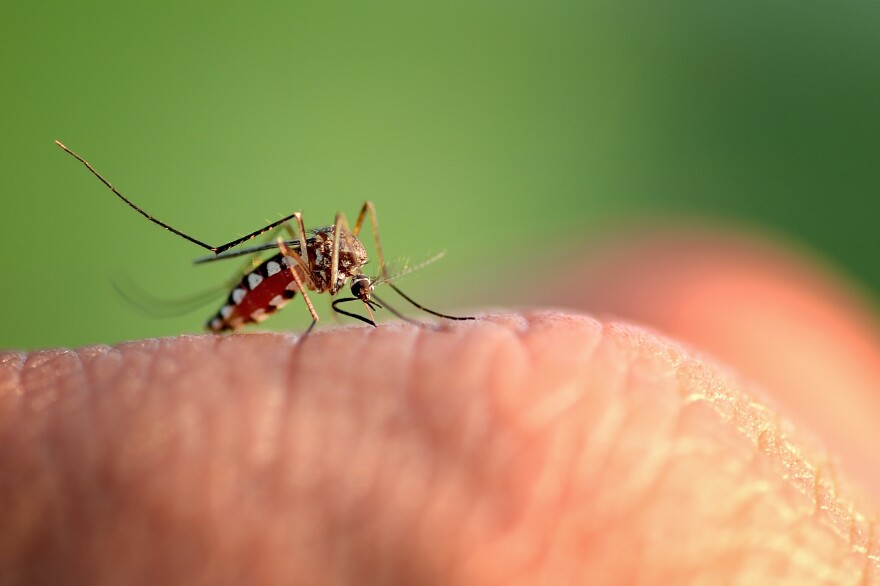As Michigan heads toward the fall season and the cooler temperatures that come with it, many might expect mosquitoes to go away. But as long as temperatures are above 50 degrees Fahrenheit, the pests will still be active, said Ned Walker, a professor at Michigan State University’s Department of Entomology.
Walker said Michigan is home to about 70 different native species of mosquitoes, with variance in their biology and seasonality. Walker said that some peak earlier in the spring while others continue until later in the summer.
But Michigan has an extended fall season for mosquitoes, which Walker said is lengthening due to climate change. Mosquito activity is temperature dependent, and because of the rising average temperatures caused by global warming, the mosquito season is able to start earlier in the spring and go longer into the fall.
For example, Walker said he and other researchers have found that in parts of Michigan, the summer floodwater mosquitoes, which would normally stop egg-hatching by September, are continuing to hatch throughout the month.
“Seasonality is not a static thing, it’s changing and dynamic, and we can have biting mosquitoes as long as the weather is warm enough,” Walker said. “If it’s 50 degrees Fahrenheit or higher, that is sufficient temperature for the insects to be able to fly.”
Walker said that the cold front currently coming in from the north will offset the likelihood of mosquitoes being out in the evenings. But there is still a risk, and this year mosquito activity is expected to continue into October.
Some mosquitoes are active during the day, but most species in Michigan bite in the dusk or at night, Walker said. In the fall, the sun sets earlier, which means there is a longer potential period for the mosquitoes to be active.
The West Nile virus is the most common arbovirus resulting from mosquito bites in the continental U.S. An arbovirus is a virus that is transmitted to humans and animals through the bites of infected arthropods, including mosquitoes, ticks, and sandflies.
Walker said he and other researchers have noticed that mosquitoes carrying the West Nile virus have been active for longer periods of time as well, lasting into October when previously their activity would have stopped a month earlier. Continued blood feeding activity into the fall means a greater potential transmission period for the virus.
Most people who have been infected with West Nile virus experience no symptoms, according to the Cleveland Clinic. But about 20% of people can have fever, rash, and muscle ache symptoms. In rare cases, it can cause serious inflammation of the brain and spinal cord.
The West Nile virus originated in central Africa and around 1999 appeared in New York City, according to Walker. Now, it is present in Michigan, and its primary carrier is the northern house mosquito.
Outbreaks more commonly occur in years that are especially hot and dry, such as this summer. Walker said that the infection rate increased in late July and early August, resulting in a spate of human cases. The virus can also infect horses that are unvaccinated, as well as other wildlife.
Probably the most common mosquito borne disease in Michigan is heartworm, Walker said. With the increase in coyote and red fox populations, which are reservoirs for that parasite, Walker warned Michiganders to be diligent and keep their dogs on preventive medicines. The disease affects a dog’s heart and lungs and can cause difficulty breathing, lethargy, and weight loss.
According to MosquitoNix, a pest control company, mosquitoes thrive in temperatures of around 80 degrees Fahrenheit. They are lethargic when it hits 60 degrees, because mosquitoes are dependent on external heat in order to survive. Once it becomes 50 degrees or colder, some breeds die while others hibernate. But while fewer mosquitoes are around, that doesn't mean they are completely gone, the company said.
Walker said that mosquitoes are able to make it through the colder periods somewhat normally. “Winters don’t kill them off. It’s a little bit of a myth that mosquitoes die off due to, shall we say, the first hard frost.”
Their activity will decrease and they will enter a period of hibernation called diapause, according to Walker. He said that the insects can sense when the days begin to shorten.
Walker said to protect against mosquito bites, avoid the times when the bugs are most active — which can be difficult for people who want to spend time outdoors in the evenings after work or school. The state does have mosquito population control programs which helps reduce the risk of mosquitoes, Walker said.
In order to prevent and protect from mosquito bites, the U.S. Centers for Disease Control and Prevention recommends using EPA-registered insect repellents, wearing loose and long-sleeved shirts and long pants, and running a fan in outdoor porch or patio areas. They also recommend emptying places that can hold rainwater — such as birdbaths, flower pots, or pet bowls — to limit mosquito breeding sites.





